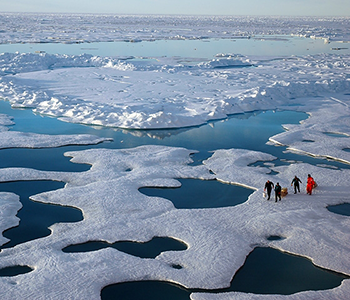Tuesday, May 13, 2014 |
| 8:00 am |
Coffee and light breakfast / Registration, AV check-in, logistics |
| 8:30 am |
Welcome to NOAA ESRL – Sandy MacDonald (NOAA ESRL Director) |
| 8:35 am |
Workshop Overview and Objectives – Randy Dole (NOAA) |
| Session 1. The Drivers: US and NOAA Requirements for Advancing Arctic Predictions |
|---|
| 8:50 am |
National Needs for Improved Arctic Weather and Climate Predictions – David Titley (PSU, Center for Solutions to Weather and Climate Risk) |
| 9:05 am |
A Navy perspective on Current and Future Needs for Arctic Operational Predictions - Mendal Scott Livezey (US Navy) |
| 9:20 am |
NOAA Imperatives, Drivers and Service Needs – David Kennedy (NOAA) |
| 9:35 am |
NOAA NWS Arctic Operational Forecasting Perspectives – Ming Ji (NWS/NCEP) |
| 9:50 am |
Arctic Information and Regional Service Needs" – Aimee Devaris (NWS Regional Director – Alaska Region) |
| 10:05 am |
Break |
| Session 2. Scientific Foundations for Improving Predictions |
| 10:30 am |
Arctic Science for Improving Predictions – John Walsh (University of Alaska, Fairbanks, CIFAR) |
| 10:50 am |
Arctic-Lower Latitude Linkages: Implications for Weather and Climate Predictions – Judah Cohen (Atmospheric and Environmental Research) |
| 11:10 am |
Arctic Sea Ice Predictability – Marika Holland (NCAR) |
| 11:30 am |
Open discussion, with presenters of the first two sessions as panelists |
| 12:00 pm |
Lunch (on-site in Rm GB-124) |
| Session 3. Operational Predictions: Status, Challenges and Opportunities for Progress |
|---|
| 1:00 pm |
NOAA – Robert Grumbine (NOAA NCEP) |
| 1:15 pm |
Navy – Rick Allard (NRL) |
| 1:30 pm |
National Ice Center and North American Ice Service – Caryn Panowicz |
| 1:45 pm |
Environment Canada – Hal Ritchie |
| 2:00 pm |
Open discussion, with presenters as panelists |
| 2:30 pm |
Break |
| Breakout group discussions – Key Challenges and Opportunities |
|---|
| 3:00 pm |
Breakout Group Guidance (Dole) |
| 3:15 pm |
Breakout groups convene in breakout rooms
- Consider end-to-end capabilities. Take advantage of cross-disciplinary expertise.
- What are the critical gaps limiting progress?
- Are there specific high priority problems where near-term progress is feasible?
- Are there common challenges that cut across several problems that, if addressed, would allow progress on multiple problems?
|
| 5:15 pm |
Reconvene in Plenary – Summary, next steps (Dole) |
| 5:30 pm |
End of Day 1 |
| 6:30 pm |
Group dinner for those interested (Chautauqua) |
